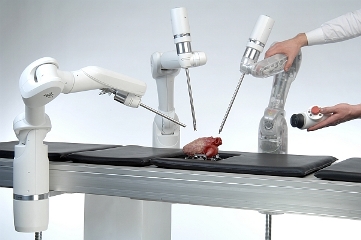MiroSurge
Funded by BFS
The goal of the project is the development of an innovative, universally applicable robot system for minimally invasive surgeries. The system is evolved against the background of the problems that arise with minimally invasive executed procedures; for example, a reduced field of view, limited hand movement and the missing feedback of haptics. In future, the application of robot systems in surgery will influence and further the development and improvement of endoscopic interventions, immensely.
The MiroSurge system is developed with regard to a broad application spectrum. It provides assistance during various interventions including cardiac, visceral, thoracic, gynecologic and urologic surgeries.
In three years a three-arm system was developed (see figure [source: DLR]). It includes different instruments for various interventions, the complete workstation for surgeons and the software to plan and perform the surgery. A new generation of patient phantoms enables to validate the system and to verify its performance and thus the applicability in clinical daily routine. The robot is telecontrolled and can act partly or completely autonomous. If the surgeon prefers manual manipulation, he can switch the operation mode any time and move and position the arms according to his conception.
In combination with the kinetic properties of the system, the versatility is accomplished with the flexible applicable instruments. The project involves the development of new instruments for minimally invasive surgery, adapters for conventional instruments, a new endoscopic camera system and autonomous NOTES (Natural Orifice Translumenal Endoscopic Surgery) instruments. The specific phantoms provide the possibility to test, evaluate and improve the system with its features iteratively by simulating different levels of difficulty or complexity regarding specific surgery conditions.
This work is based on a cooperation between BrainLAB, the Deutsches Herzzentrum München, the Deutsches Zentrum für Luft- und Raumfahrt, the MIMED department, the KUKA Robot Group, the orthodedic deparmentment of the Klinikum rechts der Isar and the Richard Wolf GmbH.
